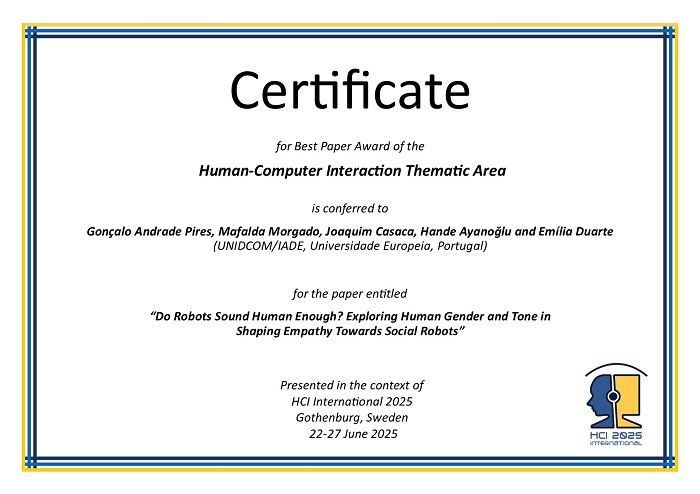The Best Paper Award of the Human-Computer Interaction Thematic Area
has been conferred to
Gonçalo Andrade Pires, Mafalda Morgado, Joaquim Casaca, Hande Ayanoğlu and Emília Duarte
(UNIDCOM/IADE, Universidade Europeia, Portugal)
for the paper entitled
"Do Robots Sound Human Enough? Exploring Human Gender and Tone in Shaping Empathy Towards Social Robots"

Goncalo Andrade Pires
(presenter)

Best Paper Award for the Human-Computer Interaction Thematic Area, in the context of HCI International 2025, Gothenburg, Sweden, 22 - 27 June 2025

Certificate for Best Paper Award of the Human-Computer Interaction Thematic Area presented in the context of HCI International 2025, Gothenburg, Sweden, 22 - 27 June 2025
Paper Abstract
This study examines the influence of voice tone and gender on empathetic responses toward robots, aiming to identify the auditory characteristics that are most conducive to positive human-robot interaction. Employing a mixed-method approach, the research engaged 60 university students in a controlled experiment to examine their reactions to robots expressing six of Eckman’s basic emotions with varied tonalities (Dramatic and Neutral) and voice genders (Male or Female). Participants were exposed to two video stimuli featuring a robot exhibiting different emotional states while moving alone within an apartment, using both neutral and dramatic tones across male and female voice types. Immediate empathetic responses were measured using the State Empathy Scale (SES), while baseline empathy levels were assessed with the Toronto Empathy Questionnaire (TEQ). The findings indicate a strong preference for dramatic tones, which were consistently perceived as more empathetic, regardless of the robot’s voice gender. Furthermore, emotionally expressive voices were favored over neutral and monochordist voicings, suggesting that more naturalistic vocal characteristics could significantly enhance user engagement with robots.
The full paper is available through SpringerLink, provided that you have proper access rights.


